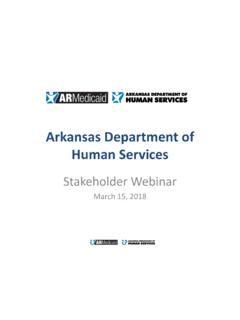Transcription of Paula Stone Deputy Director, DMS, DHS - AFMC
1 Paula StoneDeputy Director, DMS, DHS1 Outpatient mental health services available to AR Medicaid beneficiaries include: Individual, family and group counseling services provided in an outpatient agency clinic, home or school by a masters-level clinician, psychologist or RN Services provided by mental health paraprofessionals employed by outpatient agency clinics Medication to treat a mental health condition provided by an outpatient agency clinic employed physician or primary care physician2 Inpatient mental health treatment available to AR Medicaid beneficiaries include: Short-term (3 5 days) intensive treatment services provided in an acute psychiatric hospital or psychiatric unit in a medical surgical hospital Psychiatric residential treatment units or centers serving children and youth3 Substance use disorder treatment Medicaid funded program consisting of outpatient treatment services for youth and pregnant/postpartum women Medicaid beneficiaries Full array of outpatient and residential treatment services administered through eight funded treatment provider contracts through DHS Division of Behavioral Health Services4 Services are accessed directly by the client or guardian from a service provider in their community The service provider obtains authorization for services No care coordination or case management services are reimbursable5 Includes changes to.
2 Types of services Types of providers Service access Administration of the services6 Tier 1 Clinic-Based Individual behavioral health counseling Group behavioral health counseling Marital/family behavioral health counseling (Including dyadic treatment for 0 47 months) Multi-family behavioral health counseling Psychoeducation Mental health diagnosis Interpretation of diagnosis Substance abuse assessment Psychological evaluation Psychiatric assessment Pharmacologic management7 New services in REDE xisting services in BLUETier 2 Home/Community-Based Master treatment plan Crisis stabilization intervention Home and community individual psychotherapy Community group psychotherapy Home and community marital/family psychotherapy Home and community family psychoeducation Individual and group pharm counseling by RN Partial hospitalization Peer support Family support partners Behavioral assistance Intensive outpatient substance abuse treatment Adult rehabilitative day service Individual and group life skills development Child and youth support servicesClinic/Home/Community-Based Psychiatric diagnostic assessmentTier 3 Home/Community-Based Therapeutic communities for adults
3 Community reintegration program for children and youthResidential Residential treatment unit and center Community reintegration programCrisis Services Available to all Tiers Crisis Intervention Acute Psychiatric Hospitalization Acute Crisis Units Substance Abuse Detoxification Medicaid certified BH agencies will transition to new program manual and certification by June 30, 2018 Current licensed mental health practitioner program (LMHP) have begun transitioning to independently licensed practitioner (ILP) program ILP providers can provide services in Tier I ILP providers can open freestanding offices or co-locate with primary care physicians 8 Changes to way services are accessed A functional assessment performed by an independent entity (Optum) will need to be completed to receive services in Tier II or Tier III Client will be assigned a care coordination entity (PASSE) after independent assessment is completed and client is deemed to need services in Tier II or Tier III Services in Tier I and crisis services can be accessed directly from services provider 9 Care coordination through the Provider-Led AR Shared Savings Entity (PASSE) model Beginning February 1, 2017, beneficiaries identified by the independent assessment requiring services in Tier II or Tier III will be attributed to a PASSE Care coordination will be provided to these attributed beneficiaries DHS will continue to pay for services on a fee-for-service basis until December 31, 2018.
4 10 Clients who are receiving services from Medicaid providers and agencies can continue to receive services in those programs The transition of those providers and agencies from the current Medicaid program to the new program will occur prior to July 1, 2018 Each provider and agency will determine when their agency will transition to the new OBH program after the individuals they serve are independently assessed After the agency becomes an OBH provider, individuals can access Tier 1 services directly from their community provider without an Independent Assessment, but can receive services in Tier 2 or 3 only after an independent assessment. 11 The Provider-Led Arkansas Shared Savings Entity (PASSE) is a new model of organized care created by Act 775 of 2017. Providers will enter into new partnerships with each other and an experienced organization that will perform the administrative functions similar to insurance companies such as claims processing, member enrollment, and grievances and appeals.
5 Providers will retain majority ownership (at least 51%) of each PASSE. Under Act 775, the governing body of each PASSE must include several types of providers licensed or certified to deliver services in Arkansas including a Developmental Disabilities Services specialty provider, a Behavioral Health Services specialty provider, a hospital, a physician and a pharmacist. 12 The PASSE is the entity that will be regulated by the Arkansas Insurance Department (AID) as a risk-based provider organization. It will also be accountable to the Department of Human Services (DHS) under federal managed care rules that provide protections for Medicaid beneficiaries. Beginning January 1, 2019, each PASSE will pay for all services, not otherwise excluded in Act 775 provided to its members and perform other administrative functions, very similar to an insurance company. 13 The primary purpose of AID and DHS regulatory roles is to protect the interests of the consumer/beneficiary To improve the health of Arkansans who need intensive levels of specialized care due to behavioral health issues or developmental/intellectual disabilities To link providers of physical health care with specialty providers of behavioral health and developmental/intellectual disabilities services To coordinate care for all community-based services for individuals with intensive levels of specialized care needs14 To reduce excess cost of care due to over-utilization and under-utilization of appropriate care To allow flexibility in the array of services offered to the population served Will reduce costs by organizing care, not just by managing finances To increase the number of service providers available in the community to the population covered15 Phase I February 1, 2018 December 31.
6 2018 Each PASSE provides care coordination only using the Primary Care Case Management (PCCM) model Phase II Begins January 1, 2019 Each PASSE will receive a global payment, be responsible for members total cost of care, and accept full risk using the Managed Care Organization (MCO) model16 Ensuring every member has a medical home Ensuring each member s multiple plans of care are being met Organizing a formal network of providers including independent primary care physicians, independent physician specialists, BH providers, patient-centered medical homes (PCMH), federally qualified health centers (FQHCs), rural health centers (RHCs), pharmacists and DD/ID providers Ensuring every member receives the medically necessary services in his/her plan of care Providing care coordination for every member17 Beginning January 1, 2019, each PASSE will receive a global payment from DHS The Global Payment will be an actuarially sound payment to cover the entire cost of care of all non-excluded services provided to all of the members of a PASSE This calculation will include the cost of providing all services, including but not limited to, DD/ID and BH specialty services, primary care office visits, hospitalizations.
7 Personal care services and pharmaceutical services18 It includes any services a PASSE offers in addition to the mandatory and optional services covered by Medicaid state plan and applicable waiver services It will include payment for care management and care coordination It will include a reasonable cost to cover administrative expenses19 Development of a care plan based on results received from the independent assessment Development and implementation of conflict free case management Sharing timely information and data with affiliated providers, members, and family members as appropriate Reporting necessary data to ensure accountability and measure performance Centralized administrative functions such as: process claims, network adequacy, member enrollment and support, performance measurement, and development of optional incentive payments to network members20 Paula Stone 501-686-948921











